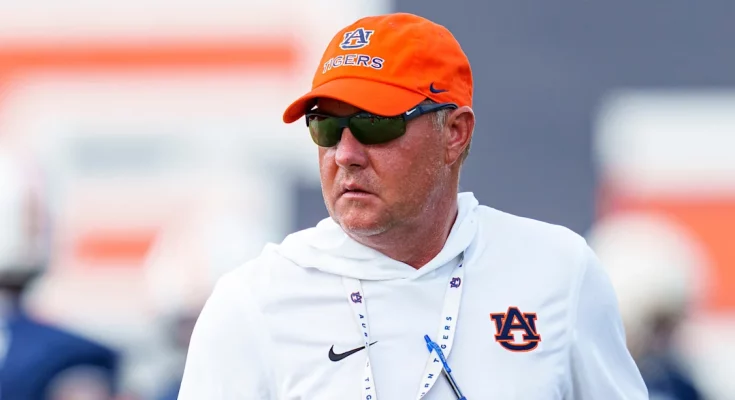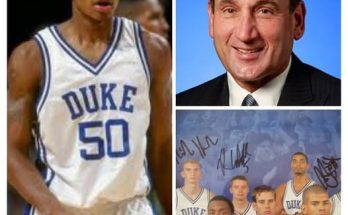In the high-stakes world of college football, patience is often in short supply, especially when a storied program like Auburn University is involved. With a rich history of success and a passionate fanbase eager for a return to prominence, the Auburn Tigers find themselves in a pivotal moment under the leadership of head coach Hugh Freeze. ESPN’s newly introduced ‘Impatience Index’ has shone a glaring spotlight on Freeze, intensifying the pressure on the coach as expectations for immediate success mount.
The ‘Impatience Index’ is a relatively new metric designed to quantify the urgency and pressure faced by coaches and programs based on factors such as recent performance, fan sentiment, media scrutiny, and the historical prestige of the team. In Auburn’s case, this index has placed Hugh Freeze near the top of the list, highlighting the swift rise in expectations and the corresponding decrease in tolerance for any setbacks. This elevated level of impatience reflects not only the desire for winning seasons but also the craving for tangible progress that can reignite Auburn’s dominance in college football.
Hugh Freeze’s arrival at Auburn was met with cautious optimism. Known for his previous coaching stints where he demonstrated an ability to turn programs around, Freeze was seen as the right man to lead the Tigers back to national relevance. However, coaching at a program with Auburn’s rich tradition comes with unique challenges. The Tigers have long been held to high standards, with fans and alumni expecting not just competitiveness but consistent championship contention. The ‘Impatience Index’ captures this reality perfectly, quantifying the pressure Freeze faces as he attempts to meet these lofty goals.
One of the main drivers behind the mounting impatience is Auburn’s recent performance history. The Tigers have experienced fluctuating success over the past several seasons, failing to consistently compete at the highest levels within the fiercely competitive Southeastern Conference (SEC). This inconsistency has left many stakeholders longing for stability and a clear vision for the future. Freeze’s tenure is now being closely watched as a barometer for whether Auburn can return to its winning ways or if more drastic changes may be necessary.
Another critical aspect influencing the ‘Impatience Index’ is fan sentiment. Auburn fans are notoriously passionate, and their collective mood can swing quickly based on the team’s performance. Social media platforms have become echo chambers of excitement, frustration, and hope, all of which feed into the overall sense of urgency surrounding Freeze’s regime. When victories come, the support swells, but any sign of stagnation or decline sparks calls for swift action. This volatile environment contributes significantly to the pressure measured by the index.
Media scrutiny further compounds the situation. Coverage by local and national outlets closely follows every development within the Auburn football program, dissecting game outcomes, recruiting successes or failures, and off-field developments. ESPN, being one of the most influential sports networks in the country, has a vested interest in highlighting these storylines, which naturally amplifies the spotlight on Freeze. The ‘Impatience Index,’ introduced by ESPN, not only serves as an analytical tool but also as a narrative device that frames the ongoing discourse around Auburn football.
Recruiting is another crucial dimension in understanding the pressure on Hugh Freeze. The SEC is known for its fierce competition in attracting top-tier talent, and Auburn must compete against powerhouses like Alabama, Georgia, and LSU. Freeze’s ability to secure high-profile recruits and build a roster capable of competing at the highest level is under intense scrutiny. Success in recruiting is often seen as a predictor of future on-field performance, and failure to consistently attract elite athletes only adds to the impatience expressed by fans and analysts alike.
The ‘Impatience Index’ also reflects the broader shifts in college football, where timelines for success have compressed dramatically. With the advent of the transfer portal, NIL (Name, Image, Likeness) deals, and increased media attention, programs are under pressure to deliver results faster than ever before. Coaches like Hugh Freeze find themselves navigating a landscape where building a program through gradual development is often overshadowed by demands for immediate wins and national relevance. The index quantifies this phenomenon, illustrating how quickly patience can evaporate in today’s fast-paced sports culture.
Despite the mounting pressure, it is important to consider the complexities involved in turning around a program like Auburn’s. The Tigers play in one of the most competitive conferences in college football, where every game presents a formidable challenge. Moreover, rebuilding a culture and establishing consistent winning habits takes time, resources, and a degree of stability. While the ‘Impatience Index’ highlights the urgency, it also raises important questions about the feasibility of expecting rapid transformation in such a demanding environment.
Hugh Freeze himself has acknowledged the challenges inherent in his position. In various interviews, he has spoken about the need for patience, perseverance, and a long-term vision. Freeze understands the expectations that come with coaching Auburn but also recognizes that sustainable success requires more than quick fixes. His approach emphasizes building relationships, developing players both on and off the field, and fostering a culture of accountability and resilience. These elements are critical to the foundation of any successful program, even if they do not immediately translate to wins.
As the season unfolds, all eyes will remain fixed on Auburn and Hugh Freeze. The ‘Impatience Index’ will continue to serve as a barometer of the mood surrounding the program, reflecting the shifting tides of hope and frustration that characterize fan engagement. For Freeze, managing this pressure while staying true to his coaching philosophy will be a delicate balancing act. Success may well depend on his ability to harness the passion of the Auburn community while building a program that can sustain excellence over time.
In the broader context of college football, Auburn’s situation is emblematic of the challenges faced by many programs with rich histories but recent struggles. The heightened expectations and shortened timelines for success, as captured by ESPN’s ‘Impatience Index,’ are realities that coaches and administrators must navigate carefully. Balancing immediate results with long-term vision is no easy task, and the outcomes of such efforts often define careers and legacies.
Ultimately, the story of Hugh Freeze and Auburn football in this era will be shaped by a combination of factors: recruiting success, on-field performance, program culture, and the ability to withstand and manage external pressures. ESPN’s ‘Impatience Index’ underscores the urgency of these demands but also invites a nuanced understanding of what it takes to rebuild a powerhouse program in today’s evolving landscape.
For Auburn fans, the hope is that Freeze can harness the impatience surrounding him as motivation rather than a burden. The Tigers’ journey toward reclaiming their place among college football’s elite is underway, and while the path may be challenging, the potential for greatness remains. As the ‘Impatience Index’ watches closely, so too does the entire college football world, eager to see if Auburn can rise to the occasion under Hugh Freeze’s leadership.



